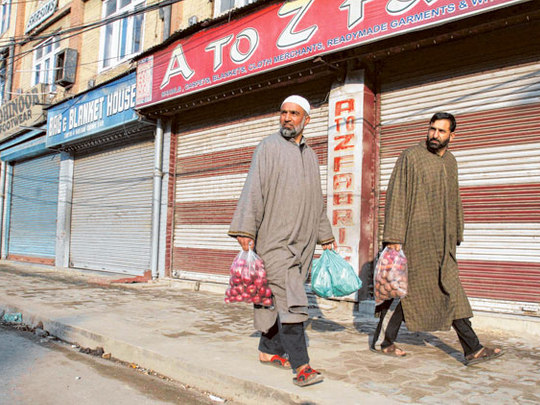
New Delhi: A day after Afzal Guru was hanged, Delhi continued to be on alert on Sunday while Delhi University lecturer S.A.R. Geelani, who was allegedly detained, said he had been advised to stay home.
“Delhi continues to be on alert and Quick Reaction Teams have been asked to be prepared for any untoward incident or protests,” said a senior Delhi Police officer.
He said the alert will continue for next two or three days depending on the situation.
Geelani, who teaches at Zakir Hussain College, Delhi University, was allegedly picked up by Delhi Police’s Special Cell on Saturday. Some other leaders from Kashmir were also detained.
Geelani was arrested in December, 2001, for his alleged involvement in the parliament attack of December 13, 2001. He was acquitted by the Supreme Court in 2003.
“They [police] did not want me to speak to the media, so they detained me. They took me to the Special Cell offices in New Friends Colony,” Geelani told IANS.
Delhi Police claimed they did not detain Geelani. However, police sources admitted that some people were being “monitored” as a preventive measure.
Police also detained Hurriyat leaders Syed Ali Shah Geelani, Mirwaiz Umar Farooq and journalist Iftikhar Gilani in Delhi.
Iftikar Gilani was released on Saturday afternoon, after media persons arrived at the scene and protested against his detention.
Meanwhile, a curfew continued without relaxation for the second day on Sunday in all ten district headquarters of Srinagar and some other places in the state.
Police said curfew restrictions had been imposed to maintain law and order in the wake of Guru’s hanging.
District magistrate Srinagar has, however, made it clear that there would be no restrictions on the movement of medical staff and those connected with other essential services, whose identity cards should be treated as curfew passes by security forces.
Meanwhile, Guru’s family members want his belongings returned to them, but a Tihar Jail official on Sunday said the government was yet to take a decision on the issue.
“Afzal Guru’s wife Tabassum and his family members have already demanded his body so that the last rites could be performed in accordance with Islam,” Afzal Guru’s cousin Yaseen Guru told IANS on phone from Sopore in Jammu and Kashmir.
Global rights groups have asked India to end the use of executions and move towards abolishing the death penalty.
“Questions need to be asked why the Indian government executed Afzal Guru now,” New York-based Human Rights Watch’s South Asia director Meenakshi Ganguly said. “No one argues that those who engage in serious crimes shouldn’t be punished, but the death penalty is brutal and irreversible, and there is no convincing evidence to suggest it serves as a deterrent,” Ganguly said. The group said it opposes the death penalty in all circumstances as an inherently irreversible, inhumane punishment. The hanging of Guru comes just three months after India executed the lone surviving 26/11 terrorist Ajmal Kasab in West Indian city Pune’s jail.












